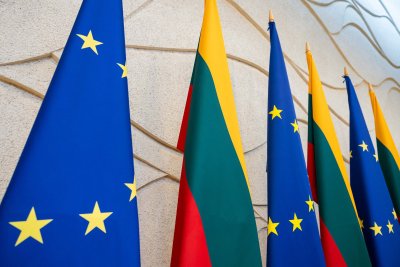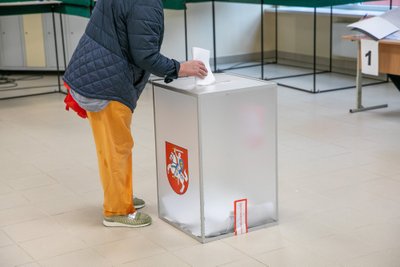A Lot Has Been Done and Achieved
As Jakaitė emphasized, the European Parliament is elected and represents all Europeans directly, thus it is important to consider not only issues that are crucial for Lithuania but also those that significantly impact all European Union Member States.
„This term of office has been exceptional for urgent responses to a number of crises: we had to manage the COVID-19 pandemic, make urgent decisions on pandemic funding, travel certificates, and vaccines. The negotiations about the European Union’s multiannual budget at the time included an additional €15 billion to address this crisis and the first ever European Union economic recovery plan,“ said the Head of the European Parliament Office in Lithuania.
The pandemic was not a sole challenge that the Union had to deal with. Another blow was the war in Ukraine.
„When Russia expanded its aggression in Ukraine and launched a full-scale invasion, the European Parliament reacted quickly and was the first to call for the country to be granted EU candidate status. The Parliament approved several financial assistance packages, including a four-year €50 billion Ukraine Facility programme, liberalised trade by removing customs fees, and made many other decisions to help Ukraine,“ Jakaitė said.

According to the Head of the European Parliament Office in Lithuania, what concerns legislation, it is worth mentioning the EU’s Green Deal and its implementation instruments: the EU’s Carbon Border Adjustment Mechanism (CBAM) which taxes imports from countries where environmental rules are more relaxed than in Europe.
„The European Parliament has banned new internal combustion engine cars starting from 2050, imposed energy efficiency rules for buildings to speed up renovation of both public and private buildings, set stricter pollution requirements for trucks and ships, introduced new sustainability and recycling requirements for packaging, and expanded the list of environmental crimes. All of these decisions were taken in order to achieve the EU’s goal of climate neutrality by 2050,“ Jakaitė explained.
The list of important decisions does not end here. The European Parliament has also become the first to introduce rules on artificial intelligence and regulated activities of major Internet platforms.
„After many years, we have also managed to agree on new rules on migration. Common EU principles on how countries should calculate the minimum monthly wage have been established. Additionally, decisions that are important for everyday activities, such as requiring manufacturers to ensure that goods can be repaired or standardising mobile phone chargers in the EU market, have been made,“ said Jakaitė.

As for decisions that are particularly significant for Lithuania, Jakaitė reminds that the country’s institutions welcomed the inclusion of instrumentalization regulation into the migration package – it addresses certain circumstances where migrants are used as tools to destabilise situation in other countries.
„The multiannual budget for 2021-2027 is also favourable for Lithuania, which still receives far more than it pays. The European Parliament has also actively supported Lithuania during the migration crisis on the border with Belarus, when the Astravets nuclear power plant started operating in Belarus, and when China exerted economic pressure on Lithuania for its decision to set up a representative office in Taiwan,“ she said.
Challenge After Challenge
Without any doubts, over the last five years, the European Parliament has managed to do a lot. However, as it was already mentioned, this parliamentary term has also been marked by several challenges, leading the Parliament to adjust parts of its agenda.
„What concerns the work of the European Parliament, even during the most difficult phases of COVID-19, the institution has managed to ensure the continuity of its functions. MEPs were able to participate in meetings and vote remotely. However, for a while, the sessions in Strasbourg were suspended,“ Jakaitė noted.

And when the war in Ukraine broke out, according to the Head of the European Parliament’s Office in Lithuania, the European Parliament has been actively supporting Ukraine not only with certain decisions made but also through all possible diplomatic means.
„Roberta Metsola, president of the European Parliament, was the first head of the EU institutions to visit Kyiv. European Parliament delegations have also visited Kyiv many times. Volodymyr Zelensky and other top Ukrainian officials have also addressed the European Parliament on several occasions,“ she said.
Why Voting in the European Parliament Elections is So Important?
According to Jakaitė, most decisions taken by the Lithuanian Seimas or the Government are the transposition of EU legislation into national law. Therefore, the European Parliament, which together with the Council of the European Union, adopts EU laws, directly influences our lives. This is why citizens of all age groups should be involved, take part in elections, and make important decisions.
„It is crucial to vote and elect the MEPs who will best represent our interests. In the period between elections, not only young people but all citizens can have a greater influence on decision-making if they act together, for example, they can join various non-governmental or interest group organisations and present their views to MEPs on behalf of these organisations,“ said the Head of the European Parliament Office in Lithuania.
Furthermore, as Jakaitė points out, democracy is always emphasised as an important condition for all of us to coexist in Europe, thus all elections – local, parliamentary, presidential, and European elections – are equally important.
„According to the characters in the European Parliament election campaign video, for many years, Europeans have only dreamt of elections and democracy, so it should not be taken for granted. Even today, more than half of the world’s population live in non-democratic regimes,“ Jakaitė pointed out.

According to her, it is also important to bear in mind how many people are affected by the results of the European Parliament elections.
„The European Parliament’s legislation affects everyone: big countries and small communities, powerful companies and startups, both globally and locally,“ she said.
The European Parliament’s legislation addresses issues that are equality important to all of us: the environment, security, migration, the social environment, consumer rights, economics, the rule of law, and many others.
„We should consider that in a world that is becoming more and more complex, less stable, and more closely intertwined, the European Union is responding to global challenges that no single European Union member country can successfully tackle alone. Facing so many challenges is a big task, and voting is a way to influence how we address them,“ said Jakaitė and reminded that Lithuanians are electing 11 MEPs out of 720.
And one more very interesting aspect to mention: for the first time in history, in the elections held on June 9, young Lithuanians born after Lithuania became a member of the European Union will be casting their ballots.

